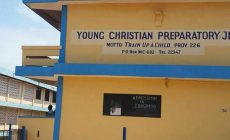No change in JHS, SHS duration – NACA clarifies
- Posted on
- Comment

The National Council for Curriculum and Assessment (NaCCA) has said the duration for both junior high school (JHS) and senior high school (SHS) education remains three years under the proposed Common Core Programme (CCP).
The council has, therefore, dispelled rumours that under the CCP curriculum, the duration of JHS will be reviewed from the current three to four years, while SHS will be two years.
In an interview with the Daily Graphic to throw light on the curriculum, the Executive Secretary of NaCCA, Dr Prince Hamid Armah, explained that the new curriculum was the second phase of the pre-tertiary curriculum review started in 2017, from which kindergarten (KG) and primary school programmes were currently being implemented by the Ghana Education Service (GES).
Review of curriculum has not affected JHS, SHS duration
What CCP seeks to do
Under the CCP, students will study a set of core subjects from Basic Seven (JHS 1) to Basic 10 (SHS 1), before opting for career-related or academic programmes from Basic 11 (SHS 2) to Basic 12 (SHS 3).
The curriculum is being designed around building character and nurturing values, in addition to ensuring seamless progression for all learners from JHS to SHS.
The implementation of the CCP is expected to be a progressive one, beginning from the 2020/21 academic year with Basic Seven curriculum, while the Basic Eight curriculum is expected to be rolled out in the 2021/22 academic, with that of Basic Nine coming on stream in the 2022/23 academic.
Explaining further, Dr Armah said the CCP sought to address the shortfalls in the current school system in relation to learning and assessment and promote better high school education that met the varied learning needs of the young people of the country.
Stakeholder engagement
The executive secretary explained that an engagement on a draft CCP curriculum from Basic Seven to Basic 10, scheduled for February 28, 2020, would solicit the views and suggestions of key stakeholders towards the finalisation of the draft curriculum.
“The meeting is scheduled for the GNAT Hall in Accra on Friday, February 28 and expected to be attended by representatives from the various teacher unions, student unions, educational directorates, school administrators, civil society organisations, as well as the public,” he added.
Dr Armah expressed optimism that the inputs by the stakeholders and feedback from the event would contribute to produce a responsive curriculum that would help “produce a new generation of Ghanaian high school graduates with the requisite 21st century skills, workplace ethos and employable skills”.
Design of CCP
As a sequel to the KG – Primary Six curriculum introduced in September 2019, the common core curriculum is a carefully designed programme of nine subjects for learners in Basic Seven to Basic 10 as part of learning experiences to prepare them for post-secondary education, the world of work or both.
“Some of the subjects that make up the CCP are Religious and Moral Education, Creative Arts and Design, Social Studies, Sciences, Computing, Career Technology, Physical and Health Education,” Dr Armah added.
Focus of CCP assessment
Touching on what the CCP assessment would focus on, he said the reform would assess knowledge, skills, attitudes and values, with emphasis on what leaners could do.
“In the 21st century, it is no longer tenable for students to memorise facts and figures without being able to apply knowledge innovatively to solve everyday problems.
“Again, the learners will do personal projects, community projects and/or community service as part of a comprehensive assessment programme designed under the National Pre-Tertiary Assessment Framework,” Dr Armah explained.
Students’ assessment
On how the students would be assessed, he said an external assessment, known as the National Standards Assessment Test (NSAT), would be conducted in JHS Two (Basic Eight) to provide national level indicators to promote learners’ progression, as captured in the National Pre Tertiary Curriculum Framework published by NaCCA in 2018.
“Placement exams into SHS may still be conducted at the end of JHS Three (Basic Nine),” he said, adding that at the end of the CCP, Common Core Examinations will be conducted to guide learners in choosing a combination of courses, either for academic or career-related pathways, once they will already be in SHS,” Dr Armah further explained.
-Graphic









 (Selorm) |
(Selorm) |  (Nana Kwesi)
(Nana Kwesi)